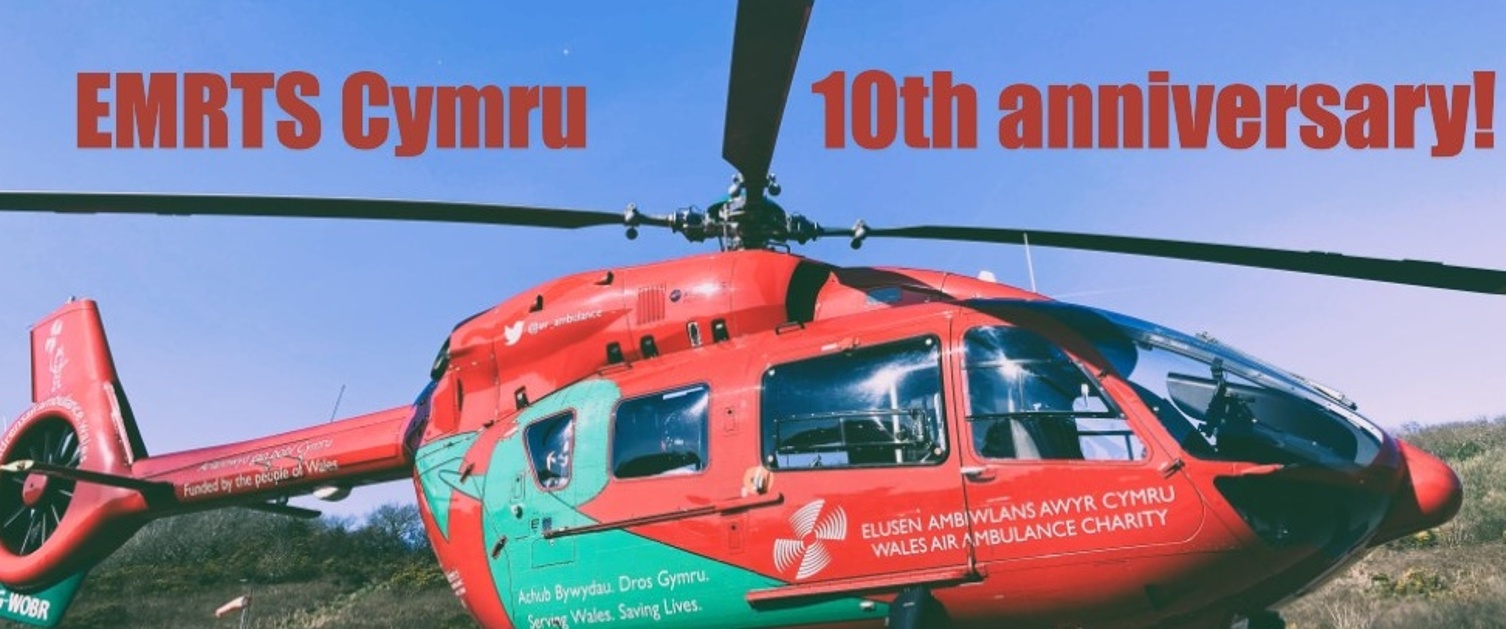EMRTS celebrates its tenth anniversary!

It was a Welshman who founded the NHS and Wales is once again responsible for leading the way with another crucial life-saving service.
More than 75 years after Nye Bevan’s vision of a national health service was realised, the Emergency Medical and Retrieval Transfer Service (EMRTS) today celebrates its own more modest anniversary.
The service launched ten years ago, providing consultants and highly trained critical care practitioners to crew the Wales Air Ambulance charity's helicopters and rapid response vehicles.
This service built on the longstanding Wales Air Ambulance Charity provision in Wales and the partnership delivered consistent pre-hospital critical care provision for the first time.
The creation of EMRTS expanded the interventions that could be provided, bringing the expertise of an emergency department to patients at the scene, with consultants and highly trained critical care practitioners able to undertake procedures such as anaesthesia and blood transfusions. Constant evaluation and research has confirmed that the service has managed to deliver on all of its ambitions including improved service provision and increased survival.
The service provides an integrated service working closely with WAST and delivers among the highest levels of service specification in Europe.
EMRTS National Director David Lockey said: “We are proud of the excellent pre-hospital critical service that we deliver to Wales and the dramatic improvements in care that we have been able to implement since the service launched 10 years ago.”
The concept for EMRTS was first conceived in 2012, and following its initial launch in 2015, has expanded across Wales and is now operating 24 hours a day, 7 days a week.
Since its inception, the EMRTS has attended almost 18,000 incidents, with around 7400 attended by the dedicated rapid response vehicles introduced to complement the fleet of Wales Air Ambulance aircraft. The service has also facilitated over 1800 inter hospital transfers to ensure that patients can access specialist care not provided in local hospitals. Fifty per cent of incidents relate to trauma, with the remainder relating to medical incidents. Over 2000 children have been attended.
The service has delivered more than 1500 emergency anaesthetics, and nearly 400 blood product transfusions outside hospital. Patients have benefited from all over the UK, whether living, working or visiting Wales.
Over ten years, the service has significantly evolved. Initially operating just two teams 12 hours a day from Swansea Airport and Welshpool, it moved to a dedicated new base in Dafen, Llanelli in 2016, and expanded into a Caernarfon base in 2017. The addition of Cardiff Heliport allowed the introduction of a night service which has attended more than 2500 overnight incidents.
The EMRTS crews now attend approximately 3500 incidents a year from 4 bases, with five teams operating during the 24 hour period. The service has grown its staff too, starting with just 43 people, to now over 120 people working to deliver a comprehensive high quality service.
In 2021 EMRTS expanded its services even further, with the addition of the Adult Critical Care Transfer Service (ACCTS). This provides an inter-hospital transfer service for critically ill adult patients.
Key to the service has been the introduction of the Critical Care Hub, which is estimated to have screened over 3.5 million 999 calls since inception to select those that would most benefit from the service.
Other changes include the introduction of a dedicated aftercare service, jointly funded by the charity and EMRTS, ensuring patients and relatives are supported beyond the initial call. There is also an ever-expanding broad research portfolio covering dispatch, novel blood products, clinical care and linguistics.
As we humbly raise a glass to all we have achieved in our first ten years, we also look to the future.
We continually review our service and seek opportunities to increase the number of patients who benefit from our advanced critical care, while improving equity of access to service.